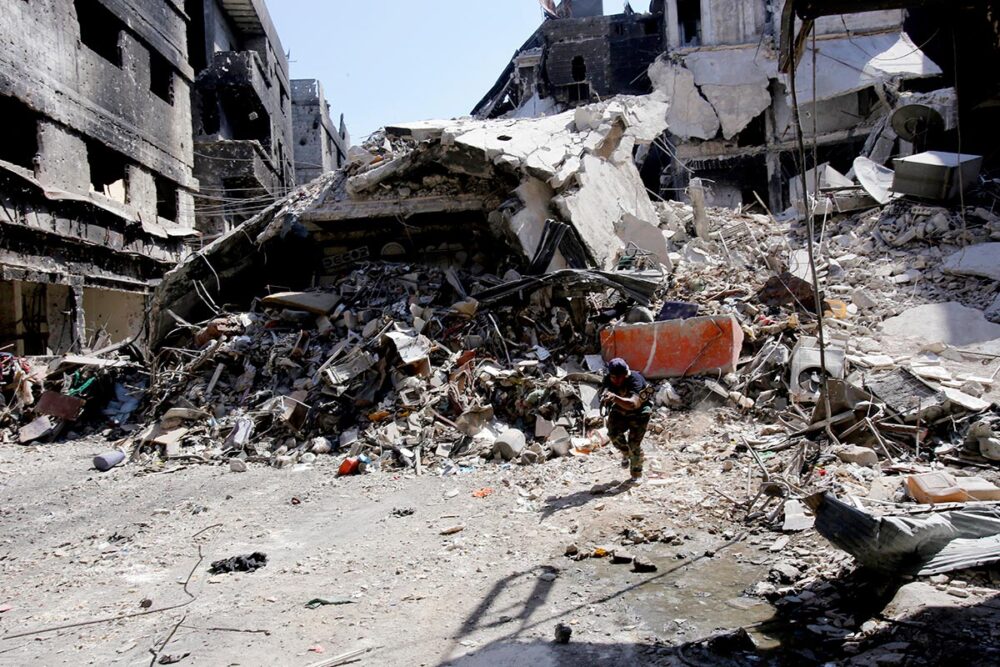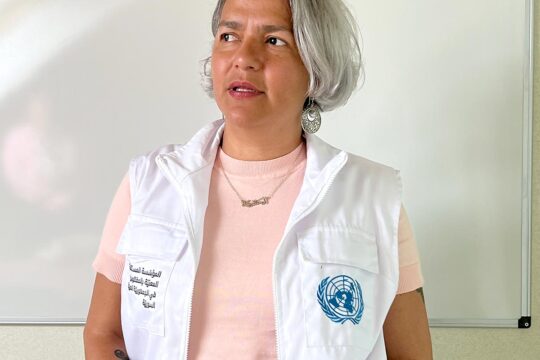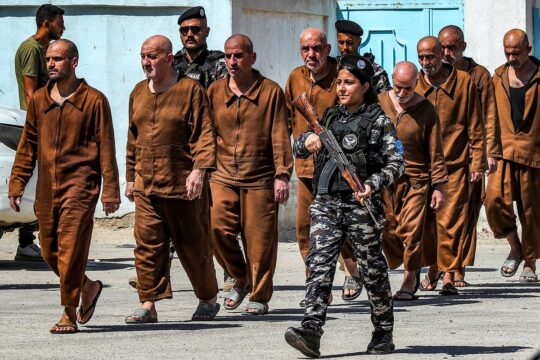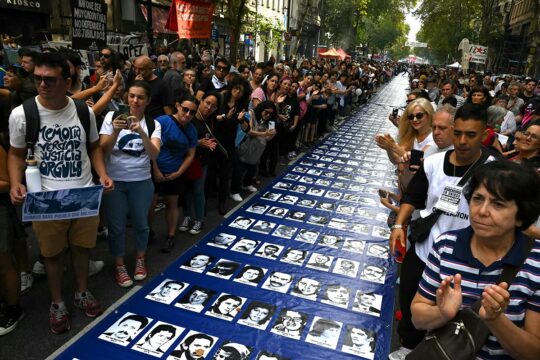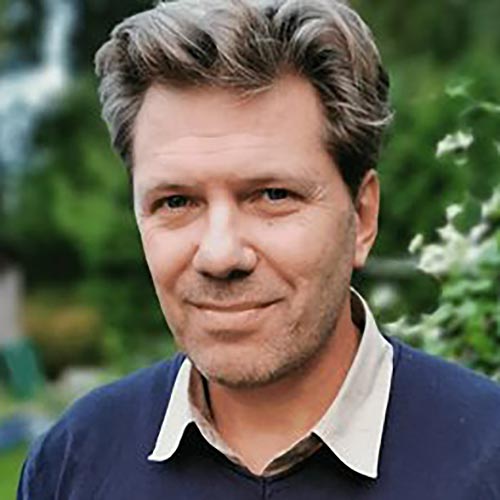A political refugee welcomed by Sweden twelve years ago, Mahmoud Sweidan, suspected of war crimes committed in 2012 and 2013 in Yarmouk, in the southern suburbs of Damascus, is currently on trial in Stockholm. Will he be the next on the already long list of Syrians convicted by a Swedish court? Or, as his lawyer intends to prove, is he the innocent victim of a smear campaign led by Syrian opposition activists?
Of the 21 judgments handed down since 2006 by Swedish courts in cases of war crimes, genocide and crimes against humanity, 11 dealt with acts committed in Syria - including seven in the last three years alone, which resulted in three acquittals and four convictions. The most recent one, handed out on July 31, concerned a former member of ISIS, a who was a Swedish national of Syrian origin, and got sentenced to life imprisonment for participating in the execution of a Jordanian pilot, burnt alive in 2014. Another trial has just ended before the Svea Court of Appeal in Stockholm against a 52-year-old woman convicted in the first instance for genocide and crimes against humanity perpetrated against Yazidis in 2015 in Raqqa, Syria. The verdict will be handed down on 11 November 2025.
For the purposes of this new trial, which began at the end of October and will last until March 2026, the court in Solna, in the northwestern suburbs of the Swedish capital, has moved to the Stockholm court’s secured courtroom number 2. The nature of the suspect, the charges, the witnesses, and the civil parties has prompted the court to exercise renewed caution.
In the basement of the court, the room is divided in two. The upper third, with three rows of seats, is reserved for the public. On the other side of a reinforced glass partition that divides the room in two, the presiding judge and the court face the public. Seated directly in front of them is the defendant, wearing a light grey hooded sweatshirt, bald but sporting a long grey-white beard that falls to his chest. To his left are his two lawyers. A little further to the left, in the same row, is the lawyer representing most of the 13 civil parties. To the right of the president sit the two prosecutors, and sometimes, behind them, the police officers who conducted the investigation. One or two interpreters take turns. There are no windows, and the furniture is made of light wood, Scandinavian style.
And the crimes of the Assad regime are displayed in this sterile atmosphere.
Accused of participating in the repression
Born in 1970 in Yarmouk, a camp created in 1957 south of Damascus to accommodate Palestinian refugees after the 1948 Arab-Israeli war, Sweidan is accused of participating, as a member or associate of a Palestinian militia loyal to the Assad regime, in a deadly shooting on 13 July 2012. During this shooting, a dozen people were killed and several others were wounded by gunfire.
Sweidan is also accused of participating for several months in maintaining the northern checkpoint on Al Battikha Square, at the edge of the camp, where, as lead prosecutor Ulrika Bentelius Egelrud states, “thanks to his good knowledge of Yarmouk and its inhabitants, he participated in the identification and control of civilians and thus denounced civilians to security services so that they could be arrested for disloyalty to the Syrian regime, which led to their deprivation of liberty”. At this checkpoint, many Syrians were victims of disappearances.
During the first days of the trial, prosecutors took turns exposing the Syrian security apparatus under former President Bashar al-Assad, the methods used to terrorize opponents or suspected opponents, the conditions of arrest and incarceration, the widespread use of extreme violence as a means of silencing relatives, and the arsenal of torture systematically deployed on detainees. A procession of humiliation, rape, and sadism that reveals the unbearable fate of thousands of prisoners crammed together without being able to sit down, ravaged by disease and insects, left in their own excrement, in absolute distress, with no hope of salvation.
“2012 was the worst year” in Syria
At the hearing, prosecutors cite reports from international organizations and NGOs. They refer to photos taken by the Syrian photographer known by the pseudonym Caesar, who, after taking thousands of photos of the bodies of tortured Syrians on behalf of the Syrian security services, managed to smuggle them to France, where he now lives.
The indictment also details the actions of Branch 235 of Syrian military intelligence, also known as the Palestinian Branch. According to Amnesty International, the “Palestine Branch 235” was responsible, among other things, for the arrest of Palestinians in Syria and the abduction and transfer of Palestinians from Lebanon to Syria.
Prosecutors take turns describing the extreme violence used by the Syrian services against prisoners. 155,604 people have been imprisoned since the beginning of the events, of whom more than 17,000 are believed to have been killed and at least 98,279 are still missing. “2012 was the worst year,” says prosecutor Egelrud.
Finally, she described the massacre in Tadamon, a neighbourhood near the Palestinian camp, on 16 April 2013, with photos and videos to support her account, the mass grave where prisoners were brought blindfolded, handcuffed, thrown onto tires, and executed with Kalashnikovs before the men of Branch 235 covered them with more tires and furniture and set them on fire. With, she said, always the executioners’ obsession with documenting and filming everything.
“None of the cases cited are related to my client”
In the middle of the morning, on the third and final day of the prosecution’s presentation of the facts, Mahmoud Sweidan’s lawyer, Sargon de Basso, interrupted the prosecutor. “None of the cases cited in these reports can be linked to my client. Do these reports cite any of the civilian parties in this trial?”
“Formally, no,” admitted the prosecutor. “It is the method we are looking at.”
The lawyer continued: “You are reviewing all the charges brought against the regime and placing them on my client’s shoulders. It would be good to make the distinction, so that the jury is not influenced by the regime’s actions when it comes to judging my client.”
“Without wishing to minimize the difficulties involved in the investigation,” the prosecutor said to Justice Info after the hearing, “it should be noted that in this type of case, the alleged crime scene cannot be inspected or visited, some of the people to be questioned cannot be reached, and the alleged acts date back a relatively long time.”
Ingrid Elovsson, the lawyer representing the 13 civil parties, spoke only to explain the legal context of possible reparations during these initial hearings. “Knowing that it is impossible to know how a Syrian judge would have judged and assessed compensation, especially given the lack of legal certainty in Syria, I therefore turned to Swedish practice,” she said, adding that it will be up to the Swedish judge to estimate the damages, if any.
“My client was not in Syria”
Two days later, when it was his turn to present his version of events, De Basso tried to dismantle the case point by point. “The Swedish authorities requested information from reputable organizations, such as [the NGO Commission for International Justice & Accountability] CIJA and the United Nations body IIMP. However, they replied that there was nothing to confirm the suspicions against my client,” he said.
“Those who refer to Mahmoud Sweidan,” the lawyer argued, “are activist media outlets. A multitude of accusations have been made against my client in pro-opposition circles, but they can be dismissed because my client was not in Syria at the time he allegedly committed serious crimes in that country.”
“It is not the investigation itself that we are criticizing,” De Basso told Justice Info, “but the decision to prosecute my client. All suspicions should have been dropped when it became clear that the sources were motivated by activism rather than legal certainty.” “There is no objective evidence to support the allegations that my client committed a crime,” the lawyer insisted.
The hearing of the civil parties will begin on 5 November 2025.


